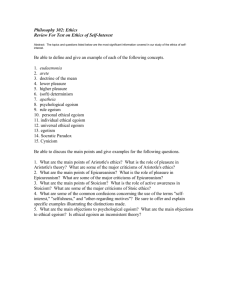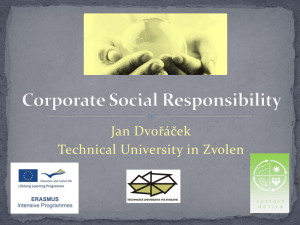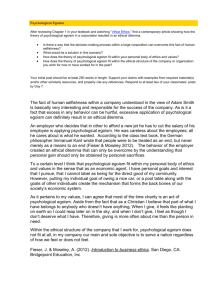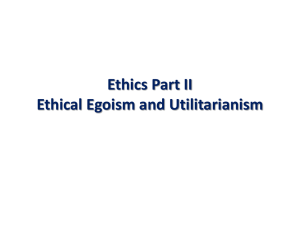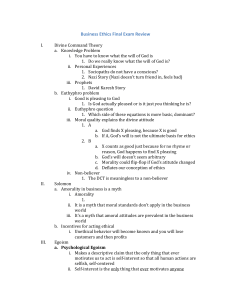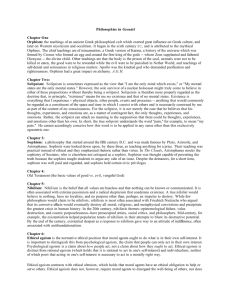The Ethics of Self Interest
advertisement
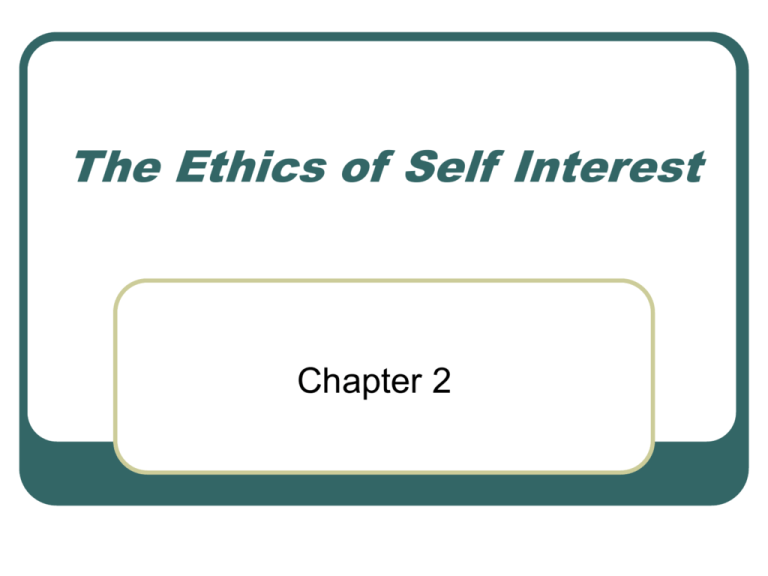
The Ethics of Self Interest Chapter 2 Classical Ideals of Life ARISTOTLE: Egoism is not egotism: man is a social animal. Happiness as an end in itself, the final end. • • Eudaemonia – loosely translated as happy and healthy and prosperous. Teleology is the study of ends, purposes, and goals (telos means "end" or "purpose"). Happiness as harmonious exercise of faculties Virtues, vices, and the golden mean • • Four cardinal virtues: temperance, courage, wisdom, justice Vices of excess and vices of deficiency • • • Cowardliness and foolhardiness and Courage is the mean Over-indulgence and Being cheap and generosity is the mean Classical Ideals of Life Epicureanism • Epicurus was an egoistic hedonist: hedonism • • from the Greek hedone (pleasure) and egoistic because one should achieve it for oneself. Epicurus believed that the good life was the pleasant life. For him, this meant avoiding pain and desires for things beyond one’s basic needs. Epicurus looked at long term goals; not short term goals. Epicureanism Continued Is it really that bad to occasionally indulge in good food and drink? Stoicism Do not seek to have everything that happens as you wish, but wish for everything to happen as it actually does happen, and your life will be serene. • ~ Epictetus Serenity prayer Don’t rely on external things. See page 55 Psychological Egoism Psychological egoism is different from ethical egoism. Ethical Egoism is about we should do, what is in our own self-interest. Psychological Egoism is not about what people should do but about what they actually do. Psychological Egoism Continued If people can’t help doing what is in their best interest then there is no point in saying what they ought to do. Psychological egoism agrees that there are unselfish acts but the motives underlying the action never are. What about “natural sympathy?” See page 61. Ethical Egoism Ethical egoism proper states that all people should do what is in their own interest. Formulations of ethical egoism: • • • • We should do what we believe with good reason will benefit us the most, We should do what is in our own interest. We should do what gives us the most pleasure or happiness. We should do whatever we prefer the most. Ethical egoism continued Virtue of Selfishness. –Ayn Rand Objections to ethical egoism • Everyone would be at war • Inconsistent advice • Inconsistency of belief • Interpersonal disputes Rule Egoism According to rule egoism, it may not be in your interest as an individual to do certain things, but it might be in your overall interest for everyone to follow the same rule. Ethical Egoism Conclusion Hereditary diseases and the ethical egoist. Would the ethical egoist support research for a disease that they don’t have? Why should I treat myself better than I treat other people? • Should my needs be met by me?
